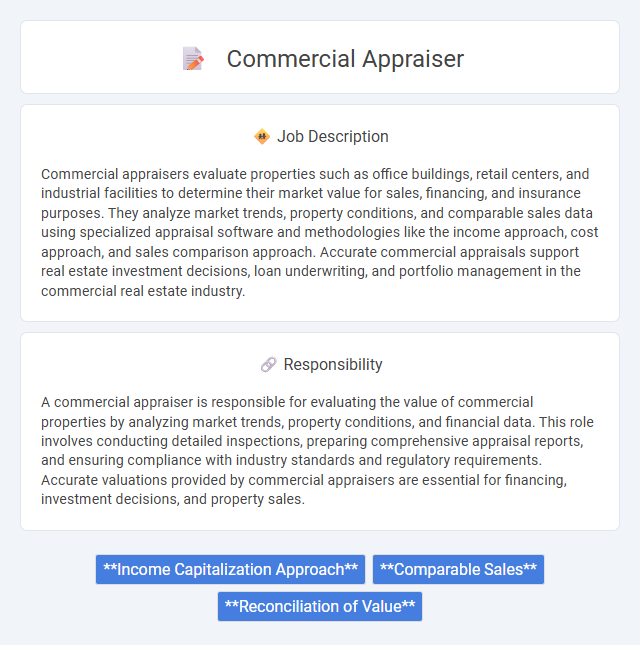
Commercial appraisers evaluate properties such as office buildings, retail centers, and industrial facilities to determine their market value for sales, financing, and insurance purposes. They analyze market trends, property conditions, and comparable sales data using specialized appraisal software and methodologies like the income approach, cost approach, and sales comparison approach. Accurate commercial appraisals support real estate investment decisions, loan underwriting, and portfolio management in the commercial real estate industry.
Individuals who are detail-oriented and possess strong analytical skills will likely be suitable for a commercial appraiser job, as it requires thorough evaluation of property conditions and market trends. Those comfortable working independently and handling complex data may find this role aligns with their strengths. Conversely, people who struggle with precision or lack interest in real estate market dynamics might face challenges in fulfilling job responsibilities effectively.
Qualification
A commercial appraiser must possess a deep understanding of real estate markets, finance, and property valuation techniques, often requiring a bachelor's degree in finance, economics, or real estate. Professional certification such as the MAI (Member of the Appraisal Institute) designation enhances credibility and demonstrates expertise in commercial property appraisal. Strong analytical skills, proficiency with appraisal software, and experience in data analysis are crucial qualifications to accurately assess commercial property values.
Responsibility
A commercial appraiser is responsible for evaluating the value of commercial properties by analyzing market trends, property conditions, and financial data. This role involves conducting detailed inspections, preparing comprehensive appraisal reports, and ensuring compliance with industry standards and regulatory requirements. Accurate valuations provided by commercial appraisers are essential for financing, investment decisions, and property sales.
Benefit
A commercial appraiser job likely offers significant financial benefits through competitive salaries and bonuses tied to property valuations. This role may provide opportunities to develop specialized expertise in real estate markets, enhancing long-term career growth and earning potential. Professionals in this field probably gain access to a dynamic work environment with varied projects, increasing job satisfaction and professional network expansion.
Challenge
Commercial appraisers likely face the challenge of accurately assessing complex properties with fluctuating market conditions and incomplete data. They may need to balance regulatory compliance and client expectations while interpreting diverse financial and physical property factors. This challenge often requires strong analytical skills and adaptability to evolving real estate trends.
Career Advancement
Commercial appraisers specialize in evaluating the value of income-producing properties, including office buildings, shopping centers, and industrial facilities. Career advancement typically involves gaining certifications such as the MAI designation from the Appraisal Institute, which enhances credibility and opens opportunities for higher-level positions or independent consulting. Experienced appraisers may progress to senior appraiser roles, management positions, or establish their own valuation firms, leveraging expertise in market analysis and investment potential.
Key Terms
Income Capitalization Approach
Commercial appraisers specializing in the Income Capitalization Approach analyze a property's potential to generate income by estimating net operating income (NOI) and applying capitalization rates derived from market data. This method is essential for valuing income-producing properties such as office buildings, retail centers, and multifamily complexes. Accurate application of the Income Capitalization Approach enables investors and lenders to assess property value based on its expected financial performance.
Comparable Sales
Commercial appraisers rely heavily on comparable sales data to accurately determine the market value of a property. They analyze recent transactions of similar commercial properties in the same area, considering factors such as location, size, condition, and sale date to ensure precise appraisals. This method provides a reliable benchmark that influences financing, investment decisions, and property tax assessments.
Reconciliation of Value
Commercial appraisers perform the Reconciliation of Value by analyzing data from multiple approaches, including the sales comparison, cost, and income capitalization methods, to determine the most accurate property value. This process involves evaluating the relevance, reliability, and accuracy of each valuation method's results to arrive at a final, well-supported opinion of value for commercial real estate. Effective reconciliation ensures a balanced, unbiased appraisal that meets industry standards and client expectations.
 kuljobs.com
kuljobs.com